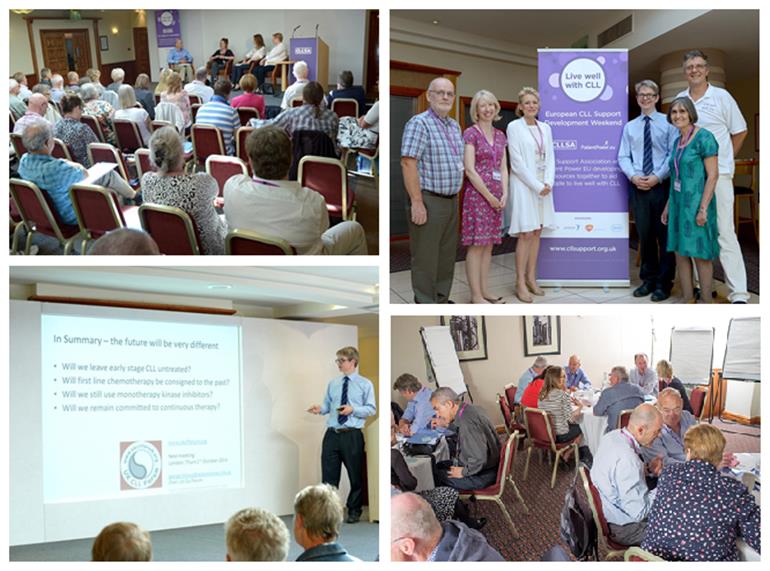The solstice weekend marks the end of the academic year in Cambridge, and the city buzzes with end-of-term hope and excitement as students celebrate their results in style before heading off into the long summer. This year saw a perfect backdrop of blue skies and sunshine to the honeyed university buildings and gothic spires of this most photogenic of cities. In the heart of the city around one hundred and twenty CLLSA UK members and a group of European CLL patient community leaders and advocates brought their own hopes and aspirations to the CLL Patients and Carers meeting on 21st, and to a pan-European CLL advocacy development workshop preceding it on 20th.
Leading patient advocates and partner organizations from a number of European countries came together on Friday to identify strategies for improving outcomes across the European CLL community. Presentations on the power of networked support and information from CLL patient advocates Andrew Schorr of the Patient-Power advocacy network, and Senior Lecturer and PhD student Julia Kennedy from Falmouth University set the scene. Existing models for successful advocacy networks were presented by OPAAL’s Kath Parsons, and Giora Sharif of the European CML Advocacy Group. Patients, carers, clinicians, industry representatives and partner organisations worked together throughout the day to share perspectives on bringing existing European support groups and stakeholders into a more powerful alliance.
A good deal of positive energy and ideas to kick-start this project emerged so watch this space for further updates as the work continues behind the scenes…
Saturday morning saw one hundred and twenty attendees for the CLL Patients and Carers Meeting gather in the downstairs lobby of the Cambridge City Hotel for coffee before getting to know each other and share CLL specific issues and experiences in groups. Dr. George Follows, CLL specialist and Consultant Haematologist at Addenbrookes, then delivered the first of his two presentations of the day in which he explained the mechanics of CLL against an overview of current approaches to its management, treatment and care. Specialist nurse Gwynn Stafford went on to discuss her important role in supporting CLL patients, and both were followed by a lively Q & A session from the floor before lunch.
The afternoon sessions began with a nursing perspective on preparing patients for and supporting them through clinical trials. Fresh from the European Haematology Association’s (EHA) meeting in Milan last week, Dr. Follows returned to the stage to sketch out the current trial landscape in the UK. Sharing some of the most recent data from trials of a number of promising novel treatment agents, he explored the implications for future CLL care in the UK.
Excitement from EHA Milan about the future of CLL treatment spilled over into Dr Follows’ talk, and into the montage of clips from UK CLL specialists attending the Congress introduced by organizer and host Nick York as part of his closing speech.
Prior to that, Andrew Schorr chaired a panel of CLL patient advocates on the stage as they discussed their own experiences. Running through the panel was a strong call to arms for collective, connected and sometimes strategic action in order to advocate for oneself and others.
These are exciting times for CLL, but new treatments raise new challenges in terms of availability and cost. Perhaps now more than ever, we need to work together to raise awareness of and ensure access to the transformational therapies bringing a tangible sense of hope to this highly engaged and energized Cambridge meeting and to the wider CLL community.
Video footage of all aspects of the day will follow so those not able to get to Cambridge can share in the considerable insights into the current CLL landscape provided by the day’s inspiring programme of speakers.
Julia Kennedy 23.06.14
